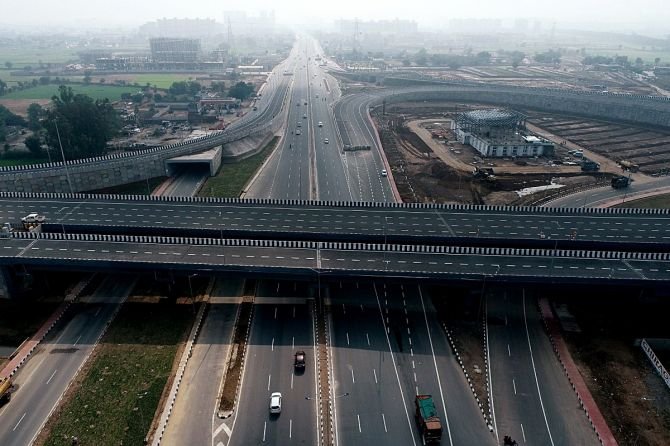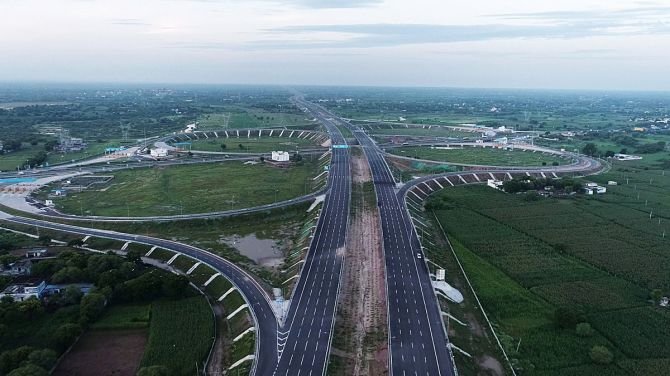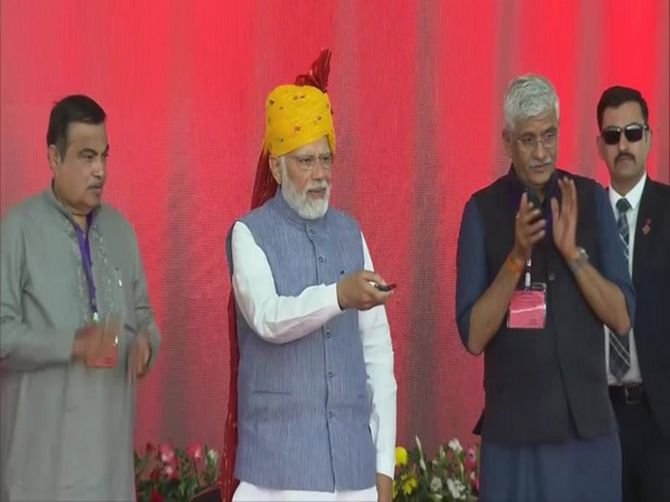The Delhi-Dausa-Lalsot stretch is set to reduce the travel time between the national capital and Jaipur considerably.
The PM pressed the button of a remote to mark the foundation laying/inauguration of a total four projects, including the first phase of the Delhi-Mumbai Expressway, worth more than Rs 18,000 crore.
Modi said when the government invests in highway projects, ports, railways, optical fibre, and opens medical colleges, it gives strength to traders, small shopkeepers and industries.
“Investment on infrastructure attracts more investment.”
Developed at a cost of more than Rs 12,150 crore, this first completed section of the Delhi-Mumbai Expressway will provide a major boost to the economic development of the entire region.
Modi said the new section will reduce the travel time between Jaipur and Delhi to half.
The PM said those who travel to Delhi for work can now come back to home in the evening after finishing their task.
The PM said that rural ‘haats’ are being developed around the expressway where the local artisans can sell their article.
He said the expressway will benefit the Sariska National Park, Keoladeo National Park, Ranthambore National Park as well as cities such as Jaipur and Ajmer.

Rajasthan is already known for its tourism sector and the attraction will increase further with the new infrastructure project, the prime minister said.
Union Road Transport and Highways Minister Nitin Gadkari, Union MoS VK Singh, Union minister Gajendra Singh Shekhawat and other leaders were present on the stage during the function.
Rajasthan Chief Minister Ashok Gehlot and his Haryana counterpart Manohar Lal khattar addressed the programme through a video link.
Rajasthan Chief Minister Ashok Gehlot and his Haryana counterpart Manohar Lal khattar addressed the programme through a video link.
While Gehlot joined the programme from the chief minister’s residence in Jaipur, Khattar addressed the event from a function held in Nuh district.

Earlier, the PMO said Modi’s emphasis on building excellent road infrastructure as an engine of growth, development and connectivity in “New India” is being realised by the construction of a number of ongoing world class expressways across the country.
The Delhi-Mumbai Expressway will be India’s longest with a length of 1,386 km.
It will reduce the travel distance between Delhi and Mumbai by 12 per cent, from 1,424 km to 1,242 km, while the travel time will be cut by 50 per cent, from the current 24 hours to 12 hours, it said.
The expressway will pass through Delhi, Haryana, Rajasthan, Madhya Pradesh, Gujarat and Maharashtra and connect major cities like Kota, Indore, Jaipur, Bhopal, Vadodara and Surat.

It will also serve 93 PM Gati Shakti Economic Nodes, 13 ports, eight major airports and as many multi-modal logistics parks along with the new upcoming greenfield airports such as Jewar Airport, Navi Mumbai Airport and JNPT port.
It will have a catalytic impact in the developmental trajectory of all adjoining regions, thus contributing in a major way in the economic transformation of the country, the PMO said.


